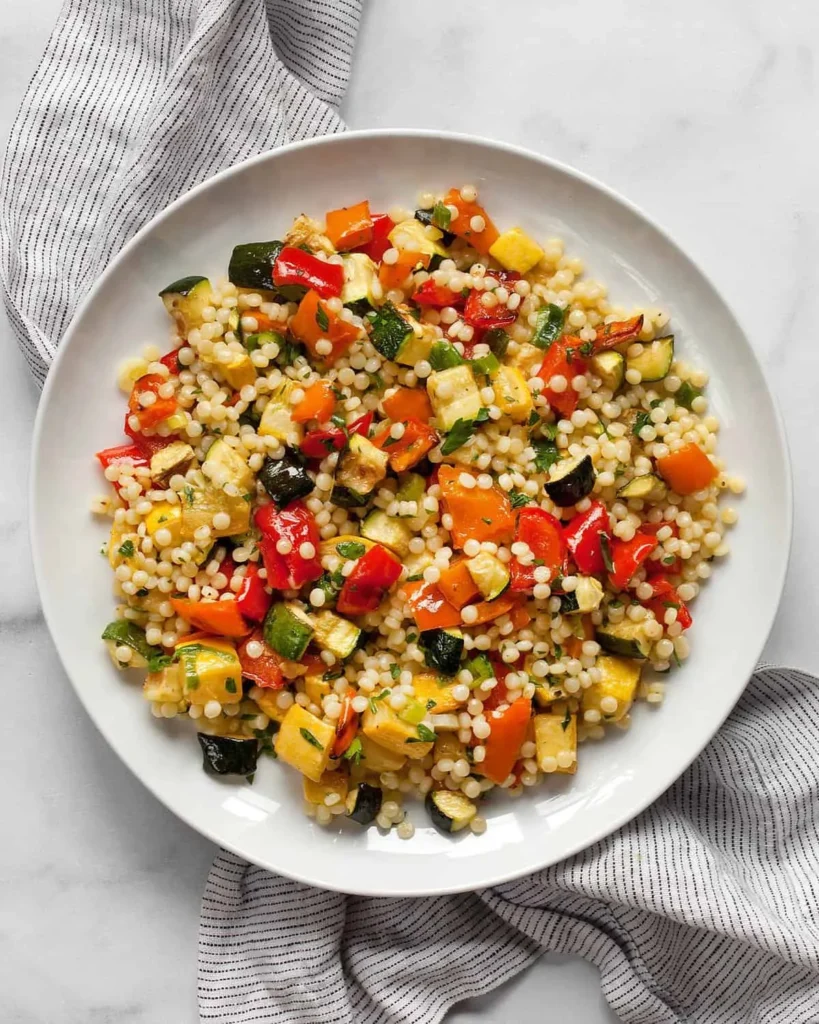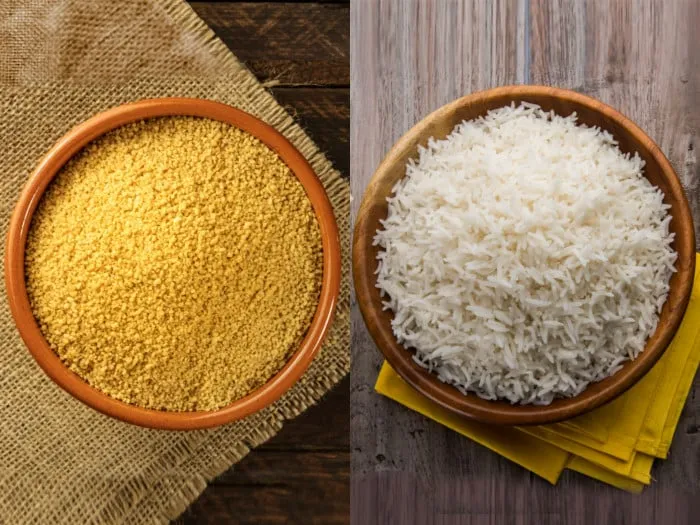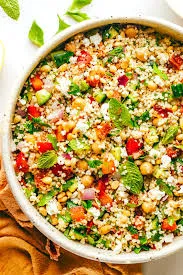This is often the dilemma: couscous vs rice? In weight loss, every type of food can make a difference. Two staple foods that have commonly found their way into discussions about healthy eating are couscous and rice. Both are very versatile, easy to prepare, and can act as a base for many dishes. But when it comes to losing weight, which one should you go with? Is it couscous or rice? It’s always a competition between couscous vs rice. Here’s an in-depth guide comparing couscous and rice nutritionally, in terms of health benefits, and some practical considerations, so you know which one is better for weight loss.
Keep in mind that while we will be discussing the goodness of each grain, it’s about your whole diet, portion control, and your individual needs and let’s see which is best for weight loss couscous vs rice.

What is couscous?
Contrary to what most people think, couscous is neither a grain nor a seed; it is a kind of pasta that is prepared from semolina and water in a dry mixture, then rolled into very minute, irregular pieces. When couscous used to be prepared daily by hand, a bowl of semolina was mixed and tossed, with water gradually added and rubbed into the mixture.
Couscous is a starch and, therefore, most meals in North African cultures stuff with the couscous, where there is a shortage of meat. Like rice, couscous is a blank canvas that can be flavored with anything you want to add to it. Mixing it up and creating something new is the entire point of being inspired to cook and by ingredients. Because couscous takes just 5 minutes to cook.
Although couscous is made from wheat, there are several types of couscous; Moroccan couscous, Golden Couscous, Pearl Couscous, and Lebanese couscous.
Moroccan couscous: It is the smallest type of couscous, and it can be cooked in just minutes. It is the healthier option nowadays, as it requires less time than any other. It is best for salads and as a base for other dishes.
Golden couscous: It is golden in color and possesses a somewhat delicious, nutty flavor characteristic of whole grains. This beautiful color is usually obtained from turmeric, a spice known for its anti-inflammatory properties.
Although its nutritional value is about the same as that of ordinary couscous, golden couscous might get a bit of added antioxidant effectiveness from the fact that turmeric is part of the formula. Turmeric is believed to be subservient to digestion and health.
Pearl couscous: It is also known as Israeli couscous. It’s a medium-sized grain, longer than Moroccan. It is slightly nutty and chewy, and you can make soups, salads, and pilaf from pearl couscous.
Lebanese couscous: Lebanese couscous is the largest grain among all the couscous and hence requires more time to cook. The best way to cook this is in soups and stews.
Benefits of Couscous
The nutritional value can vary depending on the brand and type of couscous.
Approximate nutritional value per 50g cooked couscous:
Calories: 180-200
Protein: 4-6g
Carbohydrates: 35-40g
Fiber: 2-3g
Fat: 1g
Sodium: Low
Calcium: 10mg
Iron: 1mg
Potassium: 71mg
- Plant-Based Protein
Couscous is a good source of proteins; hence, it becomes very valuable in vegetarian and vegan diets, in which it is combined with other protein sources.
- Rich in selenium
Couscous is the richest source of selenium, which is a really powerful antioxidant that basically gives health to your thyroid, boosts your immunity, and helps to reduce inflammation within the body.
- Provide Fiber
While not as high in fiber as some other whole grains, couscous still has enough to contribute towards digestion, regulating blood sugar levels, and keeping you full. Rice also has fiber content, so it is hard to pick, couscous vs rice.
- Easy to make
It cooks very quickly, and here couscous wins the battle of faster-cooking grain, couscous vs rice.
- Boosts Your Immune System
The selenium in couscous can also give your immune system a boost. This antioxidant helps reduce inflammation and boost immunity by lowering oxidative stress in your body.
What is Rice?
Rice is a staple food used by more than half of the world’s population. White rice, brown rice, and wild rice are different types of rice varieties available to use. Rice can be used as a wholesome meal or as a base for curries and stir-fries.
Again, there are some doubts about consuming rice vs couscous. Is rice healthy? Can rice be used for weight loss? Is it nutritious?

Benefits of Rice
The benefits of rice vary depending on the type of rice.
Approximately nutritional value of ¼ cup brown rice;
Calories: 180
Total Fat: 0.8g
Sodium: 1mg
Total Carbohydrates: 37g
Fiber: 1.8g
Protein: 3g
Calcium: 3mg
Iron: 1mg
Potassium: 138 mg
- Dietary fiber
You may be wondering how the fiber in couscous vs rice compares. Consuming an adequate amount of fiber from the foods you eat has a significant impact on the health of your digestive system. It controls blood sugar levels in the body.
- Nutrient-dense
It has all the vital nutrients, minerals, and antioxidants like magnesium, selenium, and B vitamins.
- Heart-friendly
Fiber and antioxidants in brown rice help reduce cholesterol and chance of heart disease.
- Weight management
Fiber content makes you feel fuller for a longer period of time and thus helps with weight management.
- Blood sugar control
Brown rice has a lower glycemic index, thus causing sugar to be released into the bloodstream from the meal at a slower rate.
Couscous vs rice nutrition

It is hard to comment about couscous vs rice. So we are going to discover more details about the nutritional value of both.
- Glycemic Index and Blood Sugar Control
The glycemic index is a measure of a food based on its relative blood sugar levels after consumption. Foods that have a high GI can increase blood sugar rapidly, followed by an increase in hunger and subsequent excessive intake of food, which definitely conflicts with weight loss.
Couscous: The instant GI of couscous is 65, considered a medium. Whereas some pear varieties have around 52 GI, which is low.
Rice: Rice has a range of GI’s. Brown rice has an average GI 66. Long grain white rice GI value is 62, whereas basmati rice has a GI value 60.
- Insulin Index
The insulin index of couscous is 84.
Rice: The insulin index of white rice is 79, brown rice has 62, and basmati rice has 57.
While rice and couscous have around the same amount of calories.
Couscous is a better option for high protein, high amounts of vitamins and minerals, and high fiber than rice.
Couscous: 3.8 g of protein per 100 g
White rice: 2.4 g of protein per 100 g
Brown rice: 2.3 g of protein per 100 g
Couscous: 1.4 grams of fiber per 100 grams
White rice: 0.4 grams of fiber per 100 grams
Brown rice: 1.8 grams of fiber per 100 grams
- Micronutrients
Both couscous and rice represent good sources for a number of crucial vitamins and minerals, although their profiles vary somewhat.
Couscous
It is a good source of selenium, an essential mineral that has a vital role in our metabolism and thyroid function. It also contains small amounts of calcium, magnesium, and iron.
Rice
White Rice: Although white rice is often enriched with many vitamins and minerals, such as folic acid, iron, and B-vitamins, it is deprived of many of these during the milling process.
Brown Rice: Compared to white rice, brown rice retains more nutrients, mostly magnesium, phosphorus, selenium, manganese, and some B vitamins.
- Satiety and Portion Control
The feeling of fullness after eating a meal is very important in weight loss. Couscous may keep you fuller for longer since it has more protein compared to white rice.
Conclusion
The couscous vs rice? It really becomes a complex debate, and thus there is no one answer that fits all. Both couscous and rice have their advantages and are otherwise considered good options for weight loss.
Adding any single grain to a balanced diet with veggies, lean proteins, and healthy fats will keep you on track toward weight loss. The final call will thus be based on what tickles your taste buds, satisfies your dietary needs, and is feasible in view of your lifestyle. Better put, it works with an approach that can continue to work well in the long run because that’s the real definition of successful weight loss. Weight loss journey is on your daily eating habit of eating couscous vs rice.
